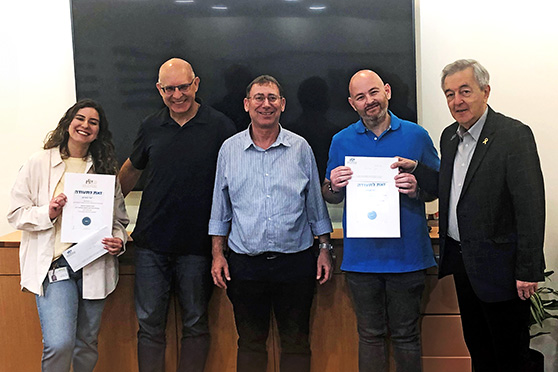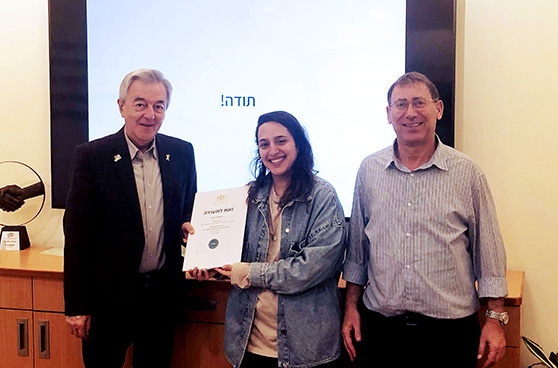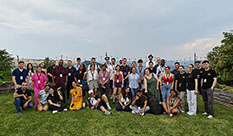More:
News & Stories
Prizes for the winners of the "Sustainable Campus" competition at HIT
Certificates of recognition and cash prizes were awarded to the winners of the first three places in the "Sustainable Campus" competition, which was held at HIT. The projects were selected by the Institute's Green Campus" Committee from dozens of projects submitted to it.

The President of HIT, Prof. Eduard Yakubov, said at the beginning of the ceremony that holding this competition was an important step, both in terms of the projects and in terms of the Institute's vision and the direction it has taken.
The President congratulated the winners and explained that the Institute is now developing an English language study program on climate issues and sustainability and that he believes that every student at HIT should take at least one course on sustainability during their studies. The President revealed at the event that he has decided to double the prize fund. "If each of us makes a small contribution to improving environmental quality and energy efficiency, the world will look different," Prof. Yakubov concluded.

HIT’s CEO, Shmuel Goldberg, explained that this year the prize fund was doubled and that the institute has systematically held the title of a leading “Green Campus” since 2010. "I hope that the planned master's degree program with a specialization in sustainability will help us move forward," said the Director General.
Ilya Levy, Chair of the Green Campus Committee at HIT, commended the activities of the dedicated committee members and in particular Ora Alfie and Dr. Elias Msinas, who continue to help raise awareness about sustainability and maintain the quality of the environment inside and outside the Institute.
The first prize was awarded to 'Embedding bacteria in wall paints' by Benny Shohat and Yael Morris, graduates of the Faculty of Electrical and Electronic Engineering.
moderated by: Dr. Yuval Dorfan and Dr. Ilana Kolodkin
Benny and Yael have developed a probiotic bacterium for wall paints to combat the black mold that accumulates on the paints. Wall mold poses many health risks. The solutions available on the market are harmful to the environment as they are based on chemicals that destroy a variety of living cells, including those that are beneficial to humans. It has been found that beneficial bacteria can be added to the wall paint instead, pushing the black mold to the brink. The beneficial bacteria remain in the paint for a long time and become active every time the humidity in the room rises.
The second prize went to Shira Cohen, a graduate of the Interior Design department, for the "ECO BLOCK".
moderated by: Ariel Lifschitz
Shira designed a residential and leisure microclimate that combines an existing structure with ecological innovations
The main objective of the "Eco Block" project is to ensure the well-being of residents and the environment. Ecological prototypes are being developed that can be "dressed" on old buildings without having to destroy and rebuild them. Their use reduces the consumption of artificial resources and attempts to recover energy with their help. The "Eco-Bock" creates improved living conditions in various ways: Creating a microclimate, balancing humidity and temperature, producing oxygen and energy, recycling gray water and creating shade to benefit the building.
The building has a circular system for filtering and recycling gray water through the façade and through ecological pools on the first floor.
Later photovoltaic panels will supply the building with electricity from solar energy.
The third prize went to Carmel Hoffman, a graduate of the Interior Architecture department, for the project “Beit Rishonim - The Greenhouse".
moderated by: Dr. Elias Masinas
The project aims to develop a holistic approach to sustainability in the areas of planning, community, economy and education. Computer programs were used to determine the climatic conditions for energy optimization in the vicinity of a building that formerly served as a community center and was converted into a public space available to several kibbutzim in the area for various joint community activities. The design was made the responsibility of the community, using local materials and building experimental displays.
- News & Events
International Week of Interdisciplinary Studies and Academic Collaborations in Crete
A substantial delegation of 16 students and four faculty members from HIT Holon Institute of Technology participated in week-long international activities and events at HMU-Hellenic Mediterranean University in Crete. ...


 Additional programs
Additional programs
